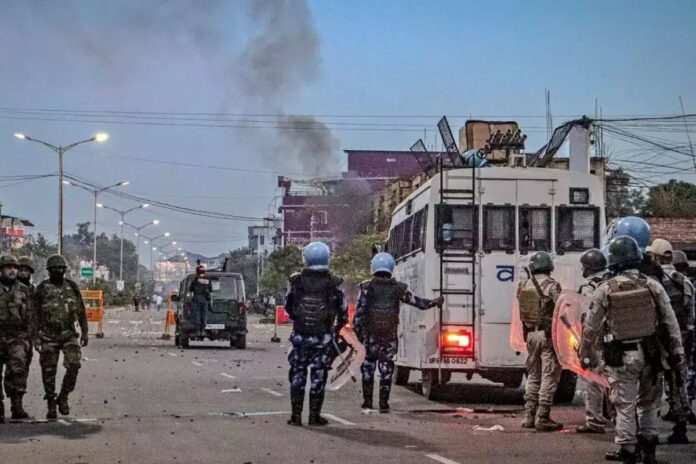A recent autopsy report has shed light on the brutal killing of a 31-year-old tribal woman in Manipur’s violence-stricken Jiribam district. The woman, a mother of three, was reportedly subjected to third-degree torture before being allegedly raped and burned alive. The tragedy, which took place on November 7, has further fueled tensions in the already troubled region, sparking violent clashes and adding to the spiralling violence that has plagued Manipur in recent months.
The woman’s body was found almost entirely charred, with 99% of her remains, including bone fragments, burned. The autopsy, conducted at Assam’s Silchar Medical College, revealed signs of extreme torture, including a wound on the back of her right thigh and a metallic nail embedded in her left thigh. The report also noted that her right upper limb, parts of both lower limbs, and her facial structure were missing. Despite these horrifying findings, the autopsy could not definitively determine whether the woman had been raped, as her charred remains made it impossible to collect a vaginal smear.
According to the First Information Report (FIR) filed by the police in Jiribam, the woman’s husband alleged that she was brutally raped by armed militants from the Imphal Valley. These assailants also looted her house and set 17 other homes ablaze in Zairwan village on the night of the attack. The Manipur Police stated that her remains were sent to Silchar instead of Imphal due to logistical difficulties caused by the ongoing ethnic crisis, which has made transportation on National Highway-37 highly unsafe.
The Indigenous Tribes Advocacy Committee and other Kuki-Zo tribal organizations have condemned the killing, describing it as a “barbaric” act. They have demanded that security forces swiftly identify and apprehend those responsible. The Indigenous Tribal Leaders Forum (ITLF) also issued a warning, stating that failure to arrest the killers would likely lead to further unrest in the region. The tribal organizations have called for intervention from the central government to ensure the safety of the Kuki-Zo-Hmar tribes, who have been among the communities most affected by the ongoing violence.

The killing of the woman, along with subsequent attacks, has triggered violent clashes in Jiribam since November 7. Just two days later, a Meitei woman farmer was killed by armed militants while working in a paddy field in Bishnupur district. On November 11, three individuals, including a Naga, were injured in attacks in Imphal East and Bishnupur districts, adding to the growing list of casualties.
The recent escalation of violence in Manipur comes after a brief lull in ethnic clashes that have claimed the lives of over 260 individuals and displaced more than 60,000 people since the unrest began earlier this year. The region has been caught in the grip of ethnic violence, primarily between the Kuki-Zo and Meitei communities, with both sides suffering significant losses. Despite the intervention of security forces, tensions remain high, and incidents of violence continue to flare up, undermining efforts to restore peace.
The incident in Jiribam underscores the severe humanitarian crisis unfolding in Manipur, with women and children bearing the brunt of the violence. The calls for justice from tribal organizations reflect the growing desperation of the affected communities, who fear that without decisive action, the cycle of violence will only continue. As Manipur grapples with the aftermath of these brutal attacks, there is an urgent need for effective intervention to prevent further loss of life and to restore some semblance of normalcy to the region.

